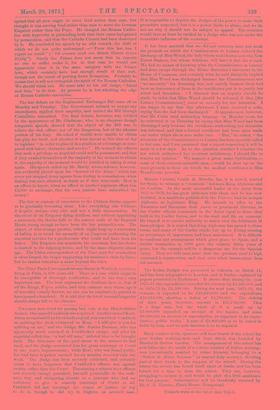The law or custom of succession to the Chinese throne
appears to be gradually becoming clear. Like everything else Chinese, it is quite unique, very odd, and not a little inconvenient. In the event of an Emperor dying childless, and without appointing a successor, the throne falls to the nearest male of the Imperial House young enough to have been the late monarch's son. The object of this strange proviso, which might keep up a succession of babies, is to avoid the anomaly of an Emperor performing the ancestral services for a predecessor who could not have been his father. The Emperor can nominate his successor, but his choice is limited to the reigning house, and by the same etiquette about age. The China correspondent of the Times says the nomination is often forged, the forger supporting his nominee's claim by force, but he cannot introduce a name beyond the rules.


































 Previous page
Previous page